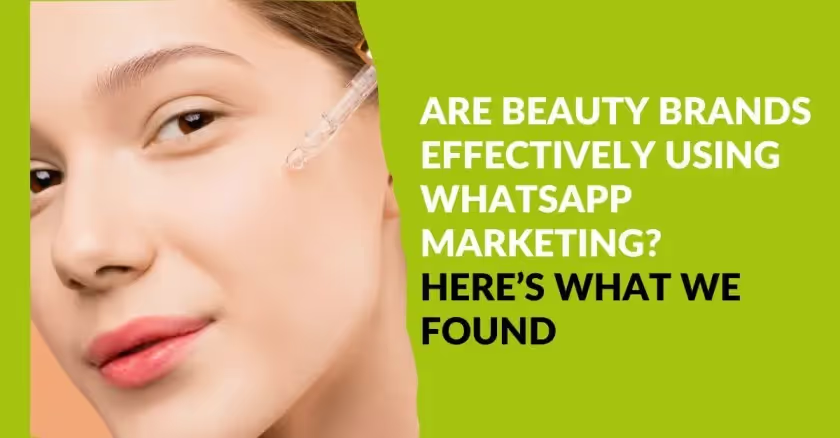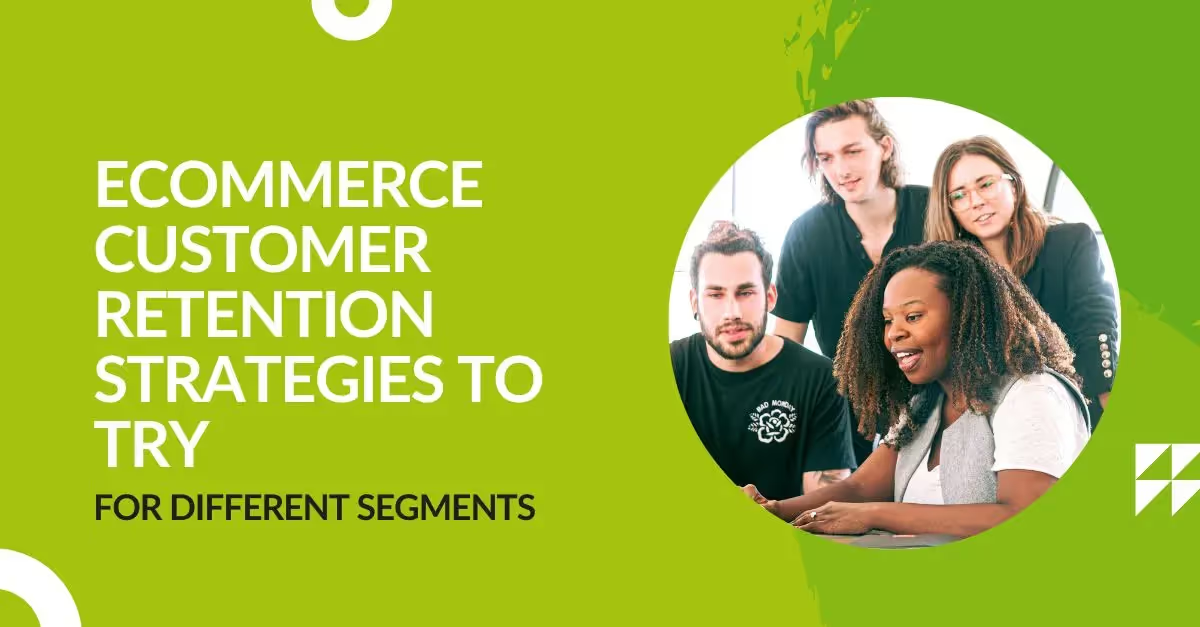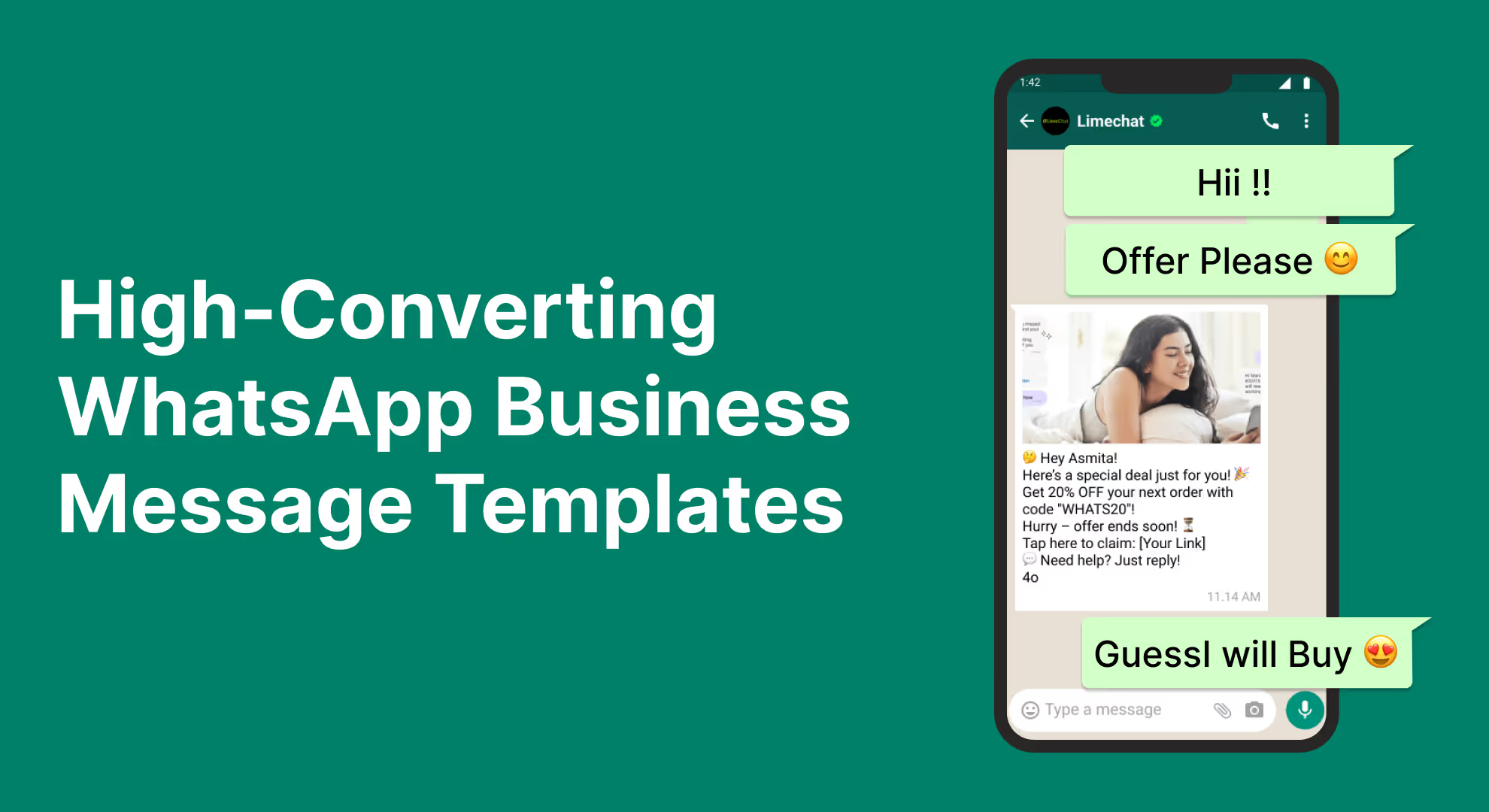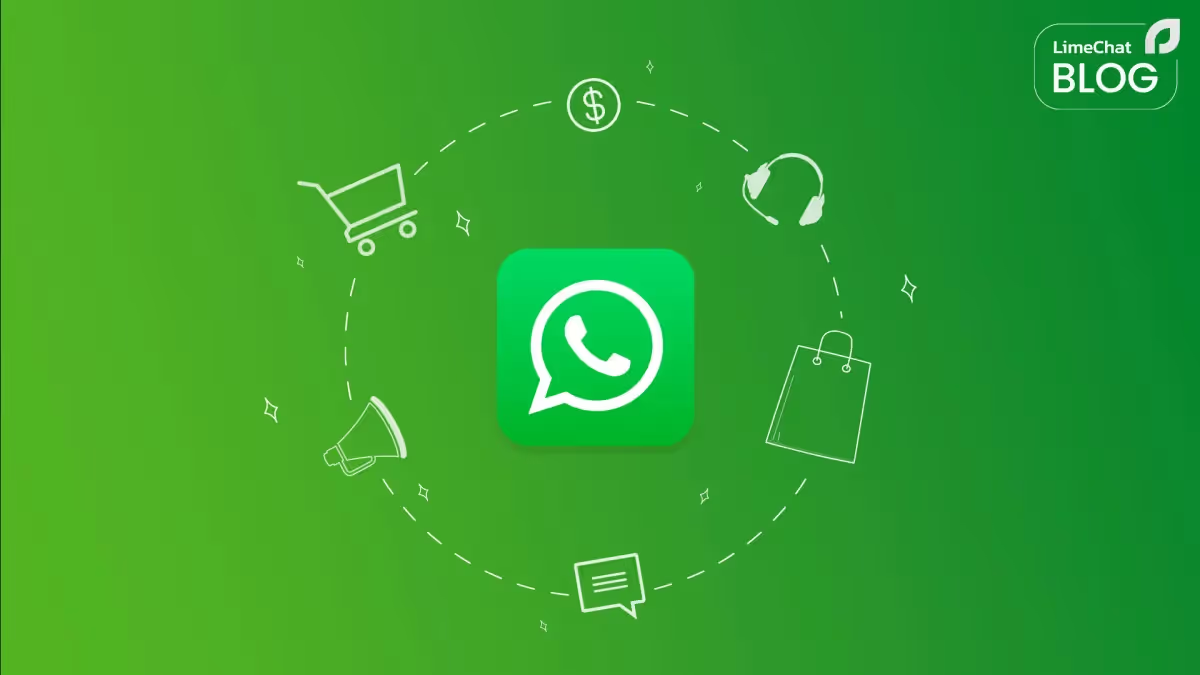How Can Beauty Brands Effectively Use Whatsapp Marketing? (And How we can Help)

Are you an e-commerce beauty brand ready to take your WhatsApp marketing to the next level?
Are you looking for a one-stop solution to WhatsApp campaigns and live chat?
You’re in the right place.
In our previous posts, we covered different WhatsApp marketing campaigns you can implement to reduce CAC and RTO and maximise CSAT — including examples of real conversations our clients have had with their customers.
Today, we will show you how your competitors respond to their customers on WhatsApp and Live Chat and how you can elevate your WhatsApp marketing game above and beyond theirs to increase your sales by 3x.
Why has social media marketing become so important for D2C beauty brands post the pandemic?
Before the pandemic, people preferred shopping for beauty products in person, from brick-and-mortar stores. McKinsey reports that online sales have more than doubled post the pandemic, while the number of these brick-and-mortar stores has gone down drastically.
What does this mean for your D2C beauty brand?
The demand for beauty and skincare products has increased massively
The pandemic brought emphasis back to well-being, particularly skincare and self-care.
By 2022, revenues for the beauty and personal care market in India will have grown to $25.45 billion. It is expected to grow at a compounded rate of 6.5% annually.
Competition among e-commerce beauty brands has gone up
With sales in the global beauty and skincare industry estimated to exceed $716 billion by 2025, more people want skin in the game (pun intended!).
Additionally, rising revenues have allowed brands already in the market to grow by almost 24% in a single year.
Customer Acquisition Cost (CAC) has gone through the roof
With increased competition, reduced funding and low return on ads, CAC has risen drastically.
While this by itself may not be a problem, it becomes a problem considering that the Customer Lifetime Value (LTV) for beauty brands is $188, and retention rate is quite low because beauty customers keep wanting to try new brands and are less loyal to a single product.
Revenues from social media marketing have increased
At the same time, revenues from advertising on social media are growing by almost 16% per year. However, along with that, ad spends and budgets are also rising rapidly. Thus, developing a watertight social media marketing strategy is hugely important for e-commerce beauty brands.
WhatsApp – the platform you should focus on the most
WhatsApp is India’s most popular messaging platform.
India’s 340 million monthly active WhatsApp users spend an average of 38 minutes daily on the app.
Additionally, customers engage the most on WhatsApp, with more than half of WhatsApp users checking the app every day, and reading 80% messages within 5 minutes of receiving them.
Almost 175 million people message business accounts on WhatsApp every day.
Finally, WhatsApp Business has an open rate of 99%, while email and other traditional marketing methods reach only 5-10% in open rates.
Thus, WhatsApp marketing is what beauty brands like yours should target most!
Are Beauty Brands Effectively Using Whatsapp Marketing? Here’s What We Found
We checked a gamut of beauty brands, from huge retailers to boutique organic stores.
The one thing they all had in common – the huge potential for improvement in their WhatsApp marketing strategy.
First, there were those brands that didn’t have any WhatsApp chat or Live Chat at all.
Lakme

It is surprising that a makeup and skincare giant like Lakme did not have any help available for goal-oriented customers, either in the form of Live Chat or social media redirections.
This approach usually overwhelms customers with choices or makes it difficult for them to find the exact product they are looking for.
The brand also loses out on the opportunity to upsell or cross-sell its products.
LimeChat recommends that:
- 74 % of shoppers get frustrated when they see products that are not personalised. Brands with many products should add a live chat or a conversational widget option to their page to deliver a curated range of products to discovery-oriented customers.
- Brands can also redirect ads to chat instead of the website, and offer quizzes to personalise their customers’ shopping experience.
- Chats and quizzes also tell the brand about their customers’ needs, concerns and preferences. Brands can use this information to upsell or cross-sell additional products (like lip liners or makeup wipes if the customer wants to purchase a lipstick).
Dot & Key

Another skincare giant, Dot & Key, relies entirely on promotional discounts and trusts that its customer base will know what they are looking for.
Customer acquisition costs for such brands may be much higher than average because an easy, streamlined, hassle-free shopping journey is one of the most important factors contributing to sales and conversions.
LimeChat recommends that:
- Brands put in an FAQ page or product guide to inform customers about the range and features of their products. Nearly 50% of all customers look for tools that save them the hassle of researching complex products and choosing between a large number of products.
- Alternately, brands can put filters on their webpage to help customers filter products based on their needs and concerns.
- For an even more personalised experience, brands can adopt a guided selling model by redirecting customers to a live chat or WhatsApp chat. A smart, automated conversational agent can ask customers pertinent questions to determine the products most likely to convert the customer and push the customer down the sales funnel to complete their purchase journey.
Intrigued? You can read more of our insights on how to start and implement guided selling and maximise your returns from this model.
Then there were the brands that did have WhatsApp Business but did not respond.
Secret Alchemist

Secret Alchemist is a holistic wellness and self-care brand that has a limited number of products.
Its webpage has succinct categories for queries regarding how to use the product, customer testimonials, and ingredients.
However, for all other pre-purchase queries, though the website allows you to talk directly to the brand on WhatsApp, the lack of response means the brand fails to promptly (or, rather, at all) solve other pre-purchase queries, like shipping, tracking etc.
Additionally, the brand cannot capitalise on returns from upselling or cross-selling its products.
LimeChat recommends that:
- 83% of shoppers require some form of support before making a purchase. Brands should therefore bring in 24/7 live chat to help customers make a choice and assist them with pre-purchase queries.
- An automated conversational agent that can imitate human conversation by asking intelligent questions and mimicking human sentiment would allow brands to convert 3x customers, cashing in even on those late-night shoppers.
Purearth

Purearth has more products than Secret Alchemist, which makes its guided selling strategy on WhatsApp very important.
However, its lack of response means the user drops off very soon into their purchase journey, never progressing down the funnel.
Further, the poor customer experience means that the user is not likely to come back to the brand, further harming the potential for future sales for the brand.
LimeChat recommends that:
- 90% of online shoppers prefer instant responses when interacting with a brand. We recommend that brands respond to customers in under a minute to make sure they remain engaged and continue their purchase journey.
- 86% of consumers spend more if brands engage with them and provide them with a fantastic experience. The best course of action would be to redirect customers to an efficient chat experience and personalise the brand’s customer purchase journey by leveraging Artificial Intelligence that can deliver intelligent support around the clock.
Finally, some brands did have WhatsApp and LiveChat marketing campaigns but could not fully capitalise on them.
Disguise Cosmetics

Disguise Cosmetics is a brand whose WhatsApp marketing strategy, for the most part, involves live agents.
By not automating its WhatsApp marketing strategy, the brand loses out on converting a large volume of potential customers that shop outside the agents’ working hours, thus losing out on sales and revenues.
An automated, smart, human-like conversational agent that could provide the same level of support as an actual customer service representative could 3x the brand’s sales.
LimeChat recommends that:
- Research shows that up to 27,000 persons are active on social media sites outside the working hours of human agents. LimeChat recommends that brands deploy AI bots in their chats to engage every customer that visits their page, thus increasing the likelihood of converting those customers.
- Automating your chats would also allow you to re-engage your customers who had dropped off at some point in their purchase journey (in a scalable and efficient way!), thus leveraging your drip campaigns.
Nykaa beauty
Nykaa beauty is a retail brand that sells beauty products from many brands, including its own line.
The assistance it provides customers is in the form of a Live Chat marketing strategy.

While the customer chats with a human representative, the agent’s responses do not sound natural or human.
The interaction seems more like an interrogation than a 2-way conversation, with the customer not being in control of the conversation and not knowing how much longer the process will take to match them with their ideal products.
This could be remedied simply by infusing some warmth in the agent’s responses, by thanking the customer for the information provided, and by letting them know which step in their purchase journey they are at.

Further, the human agent simply recommends products and indicates that this is the extent of help they will provide the customer.
The agent does not respond to further pre-purchase queries about how to choose between four recommended products.
The agent also does not drive the customer further down the funnel, which they could do by offering information about the ingredients of the product and customer reviews. This is a huge loss because the beauty industry is where customers are influenced most by product reviews and recommendations.
The agent also misses the chance to cross-sell or upsell by not leveraging product recommendations.
The conversation could be a lot more engaging simply if the agent was able to provide pictures of the product, and help the customer with other pre-purchase queries like the ingredients of the products, how to use them, and customer reviews for the product, to help the customer reach a decision on which product to choose.
LimeChat recommends that:
- With 96% of customers choosing to be loyal to companies that deliver exceptional customer experiences, now, more than ever, is the time for brands to level up their customer support systems.
- Brands should train their live chat agents on how to respond intelligently, leveraging emotion and sentiment to make the customer feel heard and understood. You can check out some templates we recommend for powerful customer support here.
- Brands should also leverage all the tools available to them to deliver a delightful customer experience by sharing product details in easy-to-understand information bites and keeping the user engaged by providing product images, product ratings, customer reviews etc.
- You can read our insights on the ultimate 2-way messaging strategy here.
Bath & Body Works
Bath & Body Works is a brand that offers a huge selection of products for every occasion, making a streamlined guided selling strategy very important.
Its current marketing strategy is mostly driven by Live Chat.


However, the brand does not employ a guided selling marketing strategy at all and does not provide the customer with any targeted assistance.
A visitor is thus likely to be overwhelmed by the number of choices available and may drop off because of information overload.
In fact, this model does not seem conducive to increasing sales at all, and the brand misses the opportunity to upsell and cross-sell other products.
The brand also loses out on engaging return customers or driving customers to make purchases again because it doesn’t make recommendations based on their order history and cannot reach out to let them know that the products they were looking for are back in stock.
LimeChat recommends that:
- Brands leverage guided selling tools like product guides, FAQ pages, and quizzes to give customers tools to filter the brand’s product range. This is a great strategy for customer retention: 53% of e-commerce customers cite “easy to use and navigate website” as their primary reason to maintain brand loyalty.
- Brands should also bring in automated customer support that can leverage information about their customers to increase sales — for example, by recommending candles with similar scents to the body mist that the customer chooses.
Let’s Show you Beauty Brands that do Whatsapp Marketing Well
So how does implementing an incredible WhatsApp marketing campaign benefit your beauty brand?
- You simplify your customers’ purchasing process, remember their preferences, and quickly guide them to the right products.
- You deploy automated mechanisms that not only scale up your reach and reduce your response times but also use a tool that can mimic the authenticity of personal conversations on a personal messaging platform.
- Thus, your chatbot helps build trust to cross-sell and up-sell additional products, helping you significantly boost your sales.
- You re-engage your customers with less effort — A user who went through your list of products and FAQs is usually interested in your brand and is more likely to convert if you keep engaging them on WhatsApp.
And these are only a few of the many benefits you’d get from implementing conversational commerce!
Excited to know more? Here are some of the campaigns LimeChat deploys to help brands 3x their sales:
Guided selling campaign – Man Matters
Man Matters is a holistic wellness platform for men. It sells products for hair, weight, skin, sex, sleep, and more, and provides online consultations for these issues and wellness.
It deploys guided selling through its main shopping webpage for discovery-oriented shoppers and on WhatsApp for goal-oriented shoppers.

Let’s take a look in detail at how they responded-
- The conversational assistant asks customers targeted questions to determine their wants and needs. Based on these goals, they make product recommendations to guide the shoppers to the optimal purchase. Thus, it personalises the shopping journey for every customer.
- Additionally, the customer is always in charge of their purchase journey – the chatbot keeps asking the customer about the next step they want to take and offering ‘buy now’ as an option to drive the customer forward through their purchase journey.

- The bot uses responses that seem human-like – it offers empathy and responds with emotional intelligence to let the customer feel like they are speaking to a great human agent.

- Since this interaction is taking place on WhatsApp, the chatbot leverages all tools that WhatsApp has to offer, including photos of products, YouTube tutorials, emojis, and information bites. The conversation remains authentic and engaging while feeding the customer just the right amount of information to keep driving them down the funnel.
- The assistant also offers helpful resources like information about how to use the product, its side effects, etc, at key points in the purchase journey, and solving every pre-purchase inquiry, thus ensuring the customer keeps moving forward through their purchase journey.

- Finally, the chat displays deals and offers at the right time so the customer completes their journey through the conversion funnel, and is able to recommend other products to increase the likelihood of cross-selling or upselling more products.
Abandoned cart campaign – Bombay Shaving Company
Bombay Shaving Company is a premium brand that offers personal care and grooming products.

- The brand’s abandoned cart campaign is a noteworthy element of its WhatsApp marketing strategy.
- Its uniqueness is such — the brand leverages LimeChat’s signature drip campaigns — like the 0, 10, 15 strategy, amongst other time-sensitive offers and promotional discounts — to remind the customer that their cart is empty and to solve their pre-purchase queries, and then, if the customer still doesn’t re-engage with the brand, sends only that customer a promotional discount of 10-15%.
- Thus, the brand leverages the drip campaign best suited to it to move the customer down the purchase funnel by offering them the option to buy the product.
Cash-on-Delivery (COD) Confirmation campaign – Bombae
Bombae offers an assortment of bold and innovative hair removal solutions for women, crafted by women.
The various campaigns it uses to reduce Return to Origin orders (RTO) are remarkable, particularly its COD confirmation campaign.

- Cash on delivery orders, despite being the most preferred mode of payment, have a higher return to origin rate than prepaid orders. This is because customers don’t have a lot to lose if their package isn’t delivered – they have no money on the line, and their enthusiasm on having made impulse purchases wanes when they have time to reflect on the purchase.
- In this example, the smart conversational assistant recognizes that the order is a COD order and has a higher chance of being non-deliverable. With this in mind, the bot leverages sentiment and emojis to keep the customer enthusiastic.
- Shortly after, it asks the customer to confirm the COD order and provides essential tracking and delivery information to help the customer make a quick decision. Thus, the bot leverages the COD confirmation campaign to reduce the brand’s Non Delivery Rate (NDR).
CSAT Campaign – WOW Skin Science
WOW Skin Science offers holistic wellness products for hair care, skincare, face, and body grooming.
Its WhatsApp marketing stands out in terms of the CSAT WhatsApp campaign — which is a combination of order confirmation, shipment status, and customer feedback campaigns.

- WOW promptly confirms the customer’s order with essential information regarding the order ID and amount, thus building trust by letting customers know exactly where their order is at each step.
- The conversational agent reassures the customer that their order will be shipped as soon as possible, leaving the customer feeling secure.
- Finally, the bot asks for customer feedback to assess their experience, helping the customer feel valued, and increasing the likelihood of a repeat sale.
These brands and their campaigns are just a few examples of how we at LimeChat leverage WhatsApp marketing campaigns to help clients achieve 3x sales.
So how can LimeChat help me out?
We at LimeChat are committed to taking that extra step to ensure our clients get the most of what they want.
LimeChat has developed many WhatsApp campaigns you can deploy to optimise your WhatsApp marketing strategy and maximise your sales.
To reduce CAC
✓ Abandoned cart – 67% of beauty brand users abandon their shopping cart because of the increasing competition between brands. Indian customers abandon their cart 51-75% of the time. Adopting a conversational assistant that automates reminders on WhatsApp, and follows up with exclusive discounts and time-sensitive deals, helps you convert these users.
✓ Reorder – Return customers generate 23% more profitability than average customers. A conversational assistant that remembers their order preferences and automates messages based on their order history can increase your sales by 3x.
✓ Cross Sell – Customers for beauty products are most likely to accept your product recommendations. A smart, human-like bot that responds immediately with similar or complementary products helps you capitalise on these returns.
✓ Regular promotional campaigns – WhatsApp Business has an open rate of 99%, which means you can get noticed as soon as you promote ongoing or upcoming campaigns.
To deal with RTO
✓ COD Confirmation – 40% of COD orders are either returned or not delivered. Adopting a conversational assistant that promptly confirms your customers’ orders helps reduce returns and non-deliveries in a scalable way.
✓ COD to Prepaid – You can convert COD orders to prepaid orders to reduce NDRs using smart automation that incentivises your customers to prepay, by offering exclusive discounts, expedited shipping, and other incentives.
✓ Non-Delivery Notification – Automate your delivery process in a scalable way to reduce NDRs.
To maximise CSAT
✓ Order Confirmation – Promptly confirming orders lets your customers feel you’re on top of their needs, out to deliver the most memorable experience to them.
✓ Order Shipment – The beauty industry has an anxious customer base. Keeping your customers reassured and updated about their order keeps them engaged and excited, delivering a delightful overall experience.
✓ Customer Feedback – Conversions in the beauty industry are most dependent on reviews from reliable sources – usually other customers. Additionally, 91% of customers consider another purchase after positive customer service. Displaying customer reviews and actively asking them for feedback drives your sales and increases their satisfaction.
How effective can LimeChat be in increasing my sales?
Incredibly effective! Don’t believe us? Speak directly to our clients.
LimeChat has, among other brands, helped the Man Company increase its sales by 3x, allowed UrbanGabru to achieve 2x conversions, and allowed Man Matters to resolve queries in under a minute to harness impulse shoppers.
And these are only a few of our beauty brand clients! We’ve delivered on our promises with many more clients, including Mama Earth, WOW Skin Science, mCaffeine, Bombay Shaving Company, and many more.
Since we’re focussed on purely ecommerce and D2C brands, we have zeroed in on templates that work for different niches like beauty, health and wellness, apparel and more- making it very easy for you to get up and running with Whatsapp Marketing.
Want to talk to us further? We can’t wait. Book a free demo now.
Transform your marketing and support today






